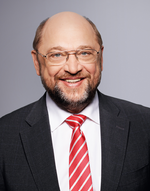Prime Minister of Besmenia
| Federal Prime Minster of the Federal Republic of Besmenia | |
|---|---|
| Bundespremierministerin der Bundesrepublik Besmenien | |
 Logo | |
 Flag of the Prime Minister | |
| Style | Mr Prime Minister Herr Bundespremierminister (informal) His Excellency (diplomatic) |
| Status | Head of Government |
| Member of | Cabinet National Security Council |
| Seat | Federal House, Laitstadt |
| Appointer | President of Besmenia |
| Term length | No fixed term |
| Constituting instrument | Basic Law of Besmenia |
| Formation | 2 July 1920 |
| Deputy | Vice Prime Minister of Besmenia |
| Salary | BS 300,000 annually |
The Prime Minister of Besmenia, officially the federal prime minister of the Federal Republic of Besmenia (Besmenian: Bundespremierminister(in) von Besmenien) is the head of government of the Federal Republic of Besmenia.
Together with the federal ministers, he forms the Besmenian government. According to the Basic Law, the Besmenian Prime Minister determines the guidelines for politics. In practice, however, he must take into account the ideas of his own party and the coalition partners. The Prime Minister proposes the Federal Ministers to the President. Without this proposal, the President cannot appoint anyone as Federal Minister. Without the participation of the President, the Prime Minister appoints one of the Federal Ministers as his official deputy, who is officially referred to as Vice Prime Minister.
Although the Prime Minister is only third in the Besmenian protocol hierarchy after the President and the President of the Federal Chamber, he is considered the most politically powerful and influential Besmenian official.
The current Prime Minister is Thomas Pühringer (BVP).
History
Political position

Election
Similar to the President, there are three rules that a Prime Minister candidate must adhere to.
- The Prime Minister candidate must be a citizen of Besmenia
- The Prime Minister candidate must be at least 28 years old
The Prime Minister candidate is nominated and confirmed by his political party for the four-year federal election.
Tenure
The Prime Minister's term of office is not limited in time like that of the president or the Federal Chamber; the appointment is permanent. The appointment of the Prime Minister and the other federal ministers by the president has nothing to do constitutionally with the elections to the Federal Chamber, nor with the term of office and the popular election of the president. In fact, it mostly correlates with Federal Chamber elections.
End of term
The term of office normally ends with the swearing in of a new government and its replacement. However, the term of office can also end prematurely with his death, his incapacity to hold office, his replacement by a constructive vote of no confidence and his resignation.
Vote of confidence
If the Prime Minister has the impression that the majority of the Federal Chamber no longer supports his policy, he can ask a vote of confidence and thus force the Federal Chamber to act itself. He can also combine the vote of confidence with a substantive decision, i.e. a draft law or another substantive motion. If the Federal Chamber does not approve the Prime Minister's motion to vote in confidence with an absolute majority, there are two options:
- The Prime Minister can decide not to draw any constitutional consequences.
- The Prime Minister can propose to the President that the Federal Chamber be dissolved; the President decides politically independently on this proposal. With the convening of the newly elected Federal Chamber, the term of office of the previous Prime Minister ends automatically, although re-election by the new Federal Chamber is possible.
Vice Prime Minister
The Vice Prime Minister is the deputy to the Besmenian head of government. The prime minister appoints a federal minister as his deputy without the participation of the president. The vice prime minister is usually a member of the small coalition partner, and is also its most important politician. The vice prime minister only assumes the function of prime minister and not the office itself. If the prime minister's term of office ends prematurely (e.g. resignation or death), the vice prime minister assumes the function and duties for a short period until a new prime minister is appointed would. This happened in 1962 with the resignation of Günther Brecht, in 1991 with the assassination of Martin Beiter and most recently in 2011 with the resignation of Ursula Kummstein.
The current vice prime minister has been Ivar Combrinck (SDU) since September 2021.
Residence

The Prime Minister's office and residence has been in the Federal House since 1973. The Federal House was built between 1969 and 1973 on Leina Island in the Mitte district in Laitstadt. After the construction was completed in May 1973, Robert Gleitzmann moved into the Federal House in September 1973 as the first Prime Minister. It replaced Bertrecht's Palace as the seat of the Prime Minister from 1920-1973.
The building also houses a private apartment for the Prime Minister and his family. The private apartment is voluntary, which means that the Prime Minister can decide for himself whether he will use it or not. So far Kurt Stöger, Theodor Sidemann and Richard Benkel have waived the private apartment of the Federal House. Martin Beiter only lived in the apartment during the week and spent the weekends with his family in Behringen.
List of Prime Minsters of Besmenia since 1920
| Portrait | Name (Birth–Death) |
Term of office | Tenure (Years and days) |
Party | Government | ||
|---|---|---|---|---|---|---|---|
| 1 | 
|
Robert Falk (1872–1955) |
2 July 1920 |
10 October 1924 |
4 years, 100 days | Besmenian Democratic Party | Falk I (1920) Falk II (1920-1924) |
| 2 | 
|
Heinz Dimmler (1876–1963) |
10 October 1924 |
21 October 1936 |
12 years, 11 days | Besmenian People's Party | Dimmler I (1924-1928) Dimmler II (1928-1932) Dimmler III (1932-1936) |
| 3 | 
|
Josef Lentscher (1884–1939) |
21 October 1936 |
2 November 1939 † |
3 years, 12 days | Besmenian People's Party | Lentscher (1936-1939) |
| 4 | 
|
Friedrich Bock (1888–1979) |
6 November 1939 |
6 October 1944 |
4 years, 335 days | Besmenian People's Party | Bock I (1939-1940) Bock II (1940-1944) |
| 5 | 
|
Albrecht Nebeling (1878–1969) |
6 October 1944 |
6 May 1958 |
13 years, 212 days | Liberal Citizen's Party of Besmenia | Nebeling I (1944-1948) Nebeling II (1948-1951) Nebeling III (1951-1954) Nebeling IV (1954-1956) Nebeling V (1956-1958) |
| 6 | 
|
Günther Brecht (1896–1986) |
6 May 1958 |
17 June 1962 |
4 years, 42 days | Besmenian People's Party | Brecht I (1958-1960) Brecht II (1960-1962) |
| - | 
|
Johannes Schmidt (1908–1996) Acting |
17 June 1962 |
25 June 1962 |
8 days | Social Democratic Union | - |
| 7 | 
|
Wolfgang Butz (1897–1975) |
25 June 1962 |
7 October 1964 |
2 years, 104 days | Besmenian People's Party | Butz (1962-1964) |
| 8 | 
|
Johannes Schmidt (1908–1996) |
7 October 1964 |
21 February 1972 |
7 years, 137 days | Social Democratic Union | Schmidt I (1964-1968) Schmidt II (1968-1969) Schmidt II (1969-1972) |
| 9 | 
|
Robert Gleitzmann (1916–1999) |
21 February 1972 |
13 March 1980 |
8 years, 21 days | Besmenian People's Party | Gleitzmann I (1972-1976) Gleitzmann II (1976-1980) |
| 10 | 
|
Martin Beiter (1945–1991) |
13 March 1980 |
5 May 1991 † |
11 years, 53 days | Free Besmenian Citizen's Party | Beiter I (1980-1981) Beiter II (1981-1985) Beiter III (1985-1989) Beiter IV (1989-1991) |
| - | 
|
Doris Klammer-Brunt (1939–) Acting |
5 May 1991 |
15 May 1991 |
10 days | Social Democratic Union | - |
| 11 | 
|
Kurt Stöger (1933–2021) |
15 May 1991 |
25 October 1993 |
2 years, 163 days | Free Besmenian Citizen's Party | Stöger (1991-1993) |
| 12 | 
|
Erik Tautenbach (1938–2019) |
25 October 1993 |
1 October 2001 |
7 years, 341 days | Besmenian People's Party | Tautenbach I (1993-1997) Tautenbach II (1997-2001) |
| 13 | 
|
Ursula Kummstein (1949–) |
1 October 2001 |
25 January 2011 |
9 years, 116 days | Free Besmenian Citizen's Party | Kummstein I (2001-2005) Kummstein II (2005-2009) Kummstein III (2009-2011) |
| - | 
|
Franz Bauer (1959–) Acting |
25 January 2011 |
1 February 2011 |
7 days | Besmenian People's Party | - |
| 14 | 
|
Jörg Rautenberg (1960–) |
1 February 2011 |
11 September 2012 |
1 year, 223 days | Free Besmenian Citizen's Party | Rautenberg (2011-2012) |
| 15 | 
|
Theodor Sidemann (1968–) |
11 September 2012 |
8 May 2021 | 8 years, 239 days | Besmenian People's Party | Sidemann I (2012-2016) Sidemann II (2016-2020) Sidemann III (2020-2021) |
| 16 | 
|
Richard Benkel (1957–) |
8 May 2021 |
9 September 2021 | 124 days | Independent | Benkel (2021) |
| 17 | 
|
Elisabeth Rademacher (1977–) |
9 September 2021 |
12 March 2024 | 2 years, 185 days | Besmenian People's Party | Rademacher (2021-) |
| - | 
|
Ivar Combrinck (1959–) Acting |
12 March 2024 |
15 March 2024 |
3 days | Social Democratic Union | - |
| 18 | 
|
Thomas Pühringer (1972–) |
15 March 2024 |
Incument | 254 days | Besmenian People's Party | Pühringer (2024-) |
Living former prime ministers of Besmenia
As of March 2024, there are 5 living former prime ministers. The most recent death of a former prime minister was Kurt Stöger (served from 1991 to 1993), on May 1, 2021, aged 87.
Ursula Kummstein (age 75)
(2001–2011)Jörg Rautenberg (age 64)
(2011–2012)Theodor Sidemann (age 56)
(2012–2021)Richard Benkel (age 67)
(2021)Elisabeth Rademacher (age 47)
(2021-2024)
Statistics
Heinz Dimmler served the longest as Prime Minister with a term of 16 years. Richard Benkel served the shortest time with only 124 days.
At the age of 35, Martin Beiter was the youngest when he took office. The oldest prime minister when he took office was Albrecht Neumann at 65.





